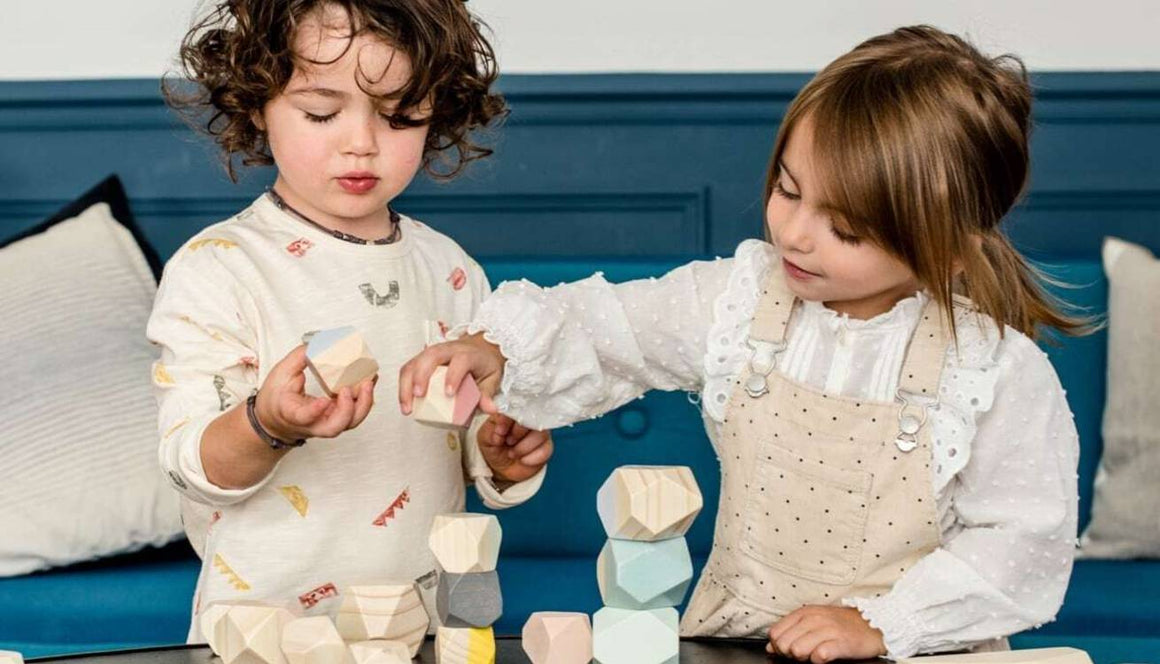Bringing up little ones can sometimes feel like you're stuck in Groundhog Day, with endless hours to fill with essentially repetitive tasks. Especially during school holidays. But if you look at all that time as an asset, you can invest it a bit differently, in what we like to call Slow Play.
What is Slow Play? Well, it's a more leisurely but focused sort of fun - and we think it has lots to recommend it.

SLOW OR OPEN-ENDED?
Slow Play overlaps with the concept of open-ended play: in other words, playtime using toys without 'fixed outcomes'. You know the sort of thing - simple props that let the fun to go wherever your child's creativity takes them. Slow Play, however, is more about the pace at which things are done. Plus it includes games and puzzles - which definitely do have fixed outcomes - but still have a major role to play in kids’ cognitive development.
So here are 6 easy ways to embrace the benefits of Slow Play.
1. Be ambitious
Even for very young children, finishing a puzzle, building a train set, baking a cake or learning to play a song is achievable. It just takes time and ambition. When we say 'ambition', we're not suggesting you turn into a nightmare pushy parent! Just suggest a goal you think will challenge your child - within reason and taking their age into account - then provide them with the right equipment, materials and encouragement to achieve it.

Giving them their very own kit - like baking equipment or a junior tool set - is often a good way to inspire them, and musical instruments that are scaled for their smaller hands are key. But the main thing is to give them something to aspire to - plus lots of encouragement to persevere.

2. Moments of mindfulness
Mindfulness is taking the time to be observant and accepting of what’s going on with our moods and our bodies and the world around us. Doesn't sound like a natural state for toddlers or kids? Actually, it isn't hard to introduce them to the concept.

Building some easy mindful exercises like these into their playtime or your daily exercise really helps to bring their focus to the present. Which has been shown to make their powers of concentration much stronger and it's also thought to help them with emotional regulation too.
3. Rotate their toys
Our kids are overstimulated. Fact. And not just by a busy world and the screens that surround us, but even by the sheer amount of toys they have. (According to research, the average 10-year-old owns 238 toys but plays with just 12 on a daily basis.) The answer? Toy rotation.
It's been proven that decreasing the number of toys they have access to increases their ability to play independently and creatively, because they get deeper into what they're doing, playing longer and more inventively with what’s around.
4. Encourage turn-taking
Turn-taking toys teach kids that waiting and observing can be as valuable a learning experience as doing. Waiting your turn is also nice and polite, of course - and an important skill to master as they get to pre-school age.

Things like fishing and memory games are great for siblings to enjoy together - or for you to play with them. At the moment we're crazy about this Kid's Concept Ludo Game. It's made from sustainable rubberwood and we love the colourful mouse pieces.
5. Create spaces
Investing some time in creating their own den, hideaway or play space benefits kids of all ages, in loads of ways - from boosting their physical development to igniting their practical thinking. They can think outside of the box and get inventive 'designing' a structure, plus they boost their language and negotiation skills if they combine their efforts.

Some kitchen chairs, cushions and a sheet will do fine (did for me and my brother), but KIDLY loves cool den kits that will have them running off into the garden for hours - days - on end. You can get in on the act too - why not indulge in some dream treehouse inspo?
6. Grow together
Gardening is the ultimate in Slow Play, for kids and adults alike. Time spent nurturing something that will take days or weeks to grow and bloom teaches kids loads. About nature and the seasons, of course, but also about the importance of patience and the deep pleasure of deferred gratification. Think of your local garden centre as an alternative toy shop. Even if you only have a window sill to work on, you could still grow something rather lovely together.

So there you have it - some tips for slowing things down. But if you need any more advice on the toys, books or kit for any stage, or any help at all, just pop us a message on Live Chat. We're here 9am - 5pm every weekday and we'll do all we can to set you on the right track. Just hit that purple button, bottom right.












